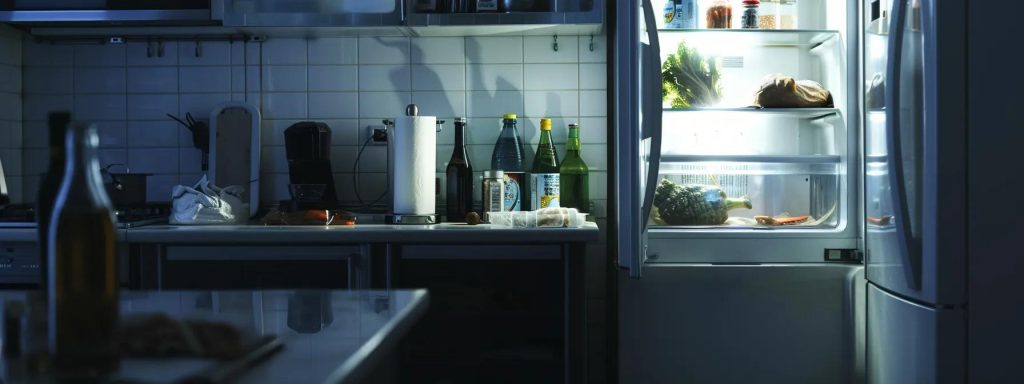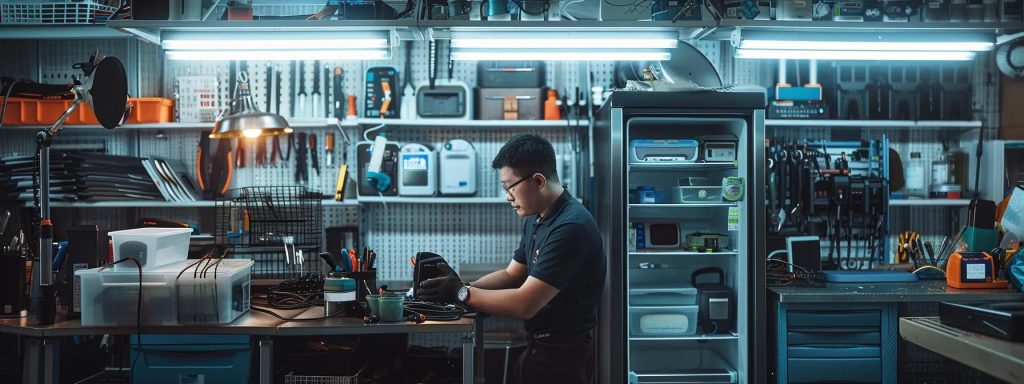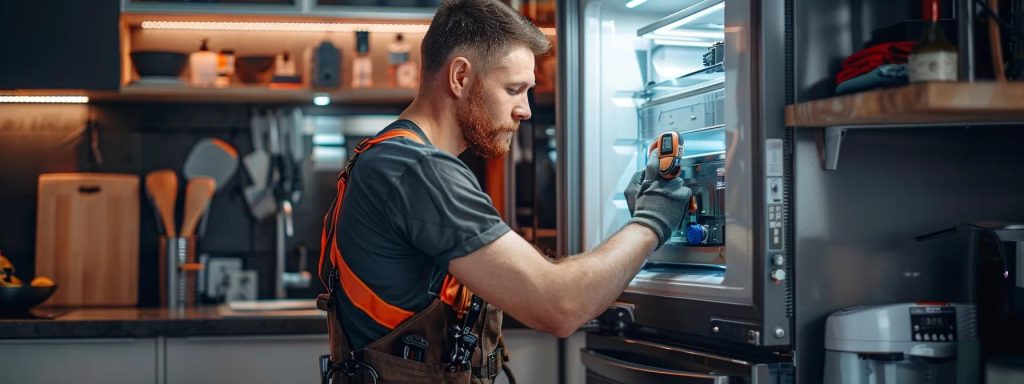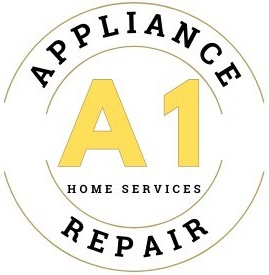Table Of Contents:
- Refrigerator Repair Tips: Expert Advice for Quick and Reliable Fridge Fixes
- Introduction
- What Are the Most Common Refrigerator Problems and How Can You Identify Them?
- How Can You Perform Basic Refrigerator Repairs at Home?
- When Should You Call a Professional Refrigerator Repair Service in Charlotte?
- How Do You Maintain Your Refrigerator to Prevent Future Repairs?
- What Are Brand-Specific Refrigerator Repair Tips for Samsung and Other Popular Models?
- How Can You Troubleshoot Refrigerator Problems Quickly?
- What Safety Precautions Should You Take During Refrigerator Repairs?
- Final Thoughts
- Frequently Asked Questions
Refrigerator Repair Tips: Expert Advice for Quick and Reliable Fridge Fixes
Introduction
A well-running refrigerator is essential for preserving food quality and preventing waste. Over time, issues like cooling fluctuations, odd noises, malfunctioning ice makers, and worn door seals can impair performance. With over 10 years of hands-on experience, this guide offers proven repair tips that cover common problems, safe at-home fixes, when to call a professional in Charlotte (or consider services like cltappliancerepair5015), and maintenance practices. Whether you face sporadic cooling issues or persistent water leakage, this expert advice will help you diagnose problems and decide on the next steps. Practical cleaning practices, including advice from homedepot, and energy-saving tips are also provided to help prevent future breakdowns.
What Are the Most Common Refrigerator Problems and How Can You Identify Them?

Refrigerator issues usually show as fluctuating temperatures, strange sounds, or water leaks. Food may spoil quickly if cooling is inconsistent, while unusual buzzing, clicking, or grinding noises often indicate mechanical or electrical faults. Leaks around the appliance might stem from the water dispenser, ice maker, or defrost drain blockages.
How to Recognize Cooling and Temperature Fluctuation Issues
Monitor the internal temperature with a reliable thermometer. Uneven or erratic temperatures can result from dirty condenser coils, a malfunctioning thermostat, or poor door seals. Check that your refrigerator is set to about 37°F and your freezer to 0°F and note any intermittent compressor operation or frequent cycling, which may signal sensor or thermostat failures.
What Causes Strange Noises in Your Refrigerator?
Strange noises such as rattling, buzzing, or squealing can be caused by misaligned fan blades, compressor issues, or ice accumulation around the motor. Listening near the compressor and checking for debris or ice can help locate the source. Addressing these sounds early may prevent bigger repairs later.
How to Detect Ice Maker and Water Dispenser Malfunctions
Issues with ice makers or water dispensers often include slow ice production, abnormal noises, inconsistent water flow, or leaks. These problems might be resolved by cleaning or replacing the water filter, checking the water valve for blockages, or ensuring proper water supply connections. A brief disconnection of the water supply can also help identify if pooling water indicates pipe issues.
When to Check Door Seals and Compressor Problems
Damaged or loose door seals allow warm air to enter, forcing the compressor to work harder. Regularly inspect door gaskets for tears or debris buildup. If the compressor runs continuously or cycles erratically, poor door sealing or internal failure might be the cause. Consistent performance issues affect energy consumption and efficiency.
How Can You Perform Basic Refrigerator Repairs at Home?
At-home repairs can be cost-effective for minor issues. Basic fixes focus on ensuring proper ventilation, cleaning essential components, and replacing worn parts.
What Are Safe Steps to Fix Cooling Problems Yourself?
Before any inspection, unplug the refrigerator to avoid shock. Clean the condenser coils—often found at the back or bottom—as dust can reduce cooling by up to 30%. Check thermostat settings and listen to the compressor’s cycling. If it runs erratically, consult your manual for a possible reset. Regular vacuuming around key components and replacing air filters can also help maintain performance.
How to Clean and Replace Refrigerator Door Seals
Unplug the unit first, then remove the door seal carefully from its groove. Clean both the door and the seal with warm water and mild detergent to remove grime. If the seal is cracked or warped, purchase a model-specific replacement and install it according to the manufacturer’s instructions. A tight seal reduces energy waste and compressor strain.
How to Troubleshoot and Reset Ice Maker and Water Dispenser
Start by checking the power supply, ensuring all water lines are secure. Inspect the water valve for blockages and clean the ice mold if needed. Many models offer a simple reset via a test button that flushes old ice and restarts the cycle. For water dispensers, replace a clogged filter if water flow is weak, and look for leaks behind the unit. Consult your manual for specific reset instructions.
When Should You Defrost Your Refrigerator to Improve Performance?
Frost buildup on cooling coils restricts airflow and reduces efficiency. Defrost your refrigerator every six months, or more often if ice accumulates. Turn off the unit, empty its contents, and let the ice melt naturally—helping to stabilize temperatures and reduce compressor stress.
When Should You Call a Professional Refrigerator Repair Service in Charlotte?

While many issues can be handled at home, certain situations warrant professional help. When troubleshooting fails or internal components require replacement, professional technicians in Charlotte use advanced diagnostic tools and genuine replacement parts. Moreover, they help detect hazards that could lead to further damage.
What Are the Benefits of Hiring Certified Refrigerator Technicians?
Certified technicians offer quality service backed by specialized training. They have access to genuine parts and can identify complex issues that may be missed during basic troubleshooting. Many professional services include warranties on labor and parts, giving you confidence in future repairs and saving you time and money.
How Fast Can You Expect Refrigerator Repair Services in Charlotte?
Repair turnaround depends on the problem and parts availability. In Charlotte, many certified providers offer appointments within 24 to 48 hours. Minor repairs might be fixed on the first visit, while more complex issues could take a few days. Some companies even provide same-day or emergency service to minimize disruption.
What Are Typical Repair Costs and Warranty Options?
Standard repairs like coil cleaning, thermostat calibration, or small part replacements typically cost between $100 and $250. Major repairs, such as compressor or significant component replacement, can exceed $500. Reputable companies usually offer warranties ranging from 90 days to a year, and many provide free diagnostic inspections.
How to Find Trusted Local Refrigerator Repair Near Me
Look for repair companies with positive customer reviews, certifications, and transparent pricing. Use search terms like “certified refrigerator repair” or “authorized service center” to find trustworthy providers. Request upfront estimates and check local directories or social media for additional insights on their reliability.
How Do You Maintain Your Refrigerator to Prevent Future Repairs?
Regular maintenance extends your refrigerator’s life and prevents costly repairs. Routine cleaning, timely part replacement, and energy optimization ensure that your appliance runs efficiently.
What Regular Cleaning Practices Extend Refrigerator Life?
Clean the interior regularly with a warm water and mild detergent solution to remove spills and prevent mold. Clean the condenser coils and dust filter at least twice a year to keep airflow unobstructed. Additionally, dispose of expired food to avoid odors and sensor malfunctions.
How Often Should You Check and Replace Refrigerator Parts?
Inspect door seals, water filters, and condenser coils every three to six months. Replace worn components such as door gaskets or old water filters immediately to avoid further complications. Maintaining a log of these checks can help keep your appliance in peak condition while also reducing energy consumption.
What Are Energy-Saving Tips to Keep Your Fridge Running Efficiently?
For optimal performance, set your refrigerator to 37°F and your freezer to 0°F. Allow warm foods to cool before storing them, and keep the refrigerator away from heat sources like ovens or direct sunlight. Ensure sufficient clearance around the appliance for proper ventilation.
How to Monitor Temperature Settings for Optimal Performance
Use an appliance thermometer to check internal temperatures periodically. Modern refrigerators often have digital displays and self-diagnostic tools; use these to monitor performance and detect sensor or airflow issues early. Regular checks help maintain consistent food preservation and energy conservation.
What Are Brand-Specific Refrigerator Repair Tips for Samsung and Other Popular Models?

Different brands have unique designs and common issues that require specific repair methods. Understanding manufacturer-specific troubleshooting procedures helps prevent improper repairs and voided warranties.
How to Troubleshoot Samsung Refrigerator Cooling and Ice Maker Issues
For Samsung refrigerators, verify the digital temperature settings and inspect condenser coils for dust or frost buildup. Many models include a diagnostic mode via the control panel to check for sensor or control board errors. For ice maker problems, ensure the water filter is current and the inlet valve is clear. A soft reset by unplugging for five minutes may resolve intermittent faults.
What Are Common Repair Solutions for Other Leading Refrigerator Brands?
LG units may need digital thermostat recalibration, while GE models might require compressor or door seal replacements. Kenmore and Whirlpool often face issues with water dispensers or ice makers that can be resolved with routine maintenance such as filter changes and coil cleaning. Always consult the user manual for model-specific troubleshooting tips.
When Is It Best to Use Manufacturer-Authorized Repair Services?
For issues beyond basic fixes—especially those affecting high-end models with advanced controls—it is best to use manufacturer-authorized services. Certified professionals ensure repairs are done according to brand standards, reducing the risk of recurring issues and preserving warranties.
How Can You Troubleshoot Refrigerator Problems Quickly?
Quick troubleshooting minimizes downtime and prevents food spoilage. A systematic approach helps you address issues before they escalate into major repairs.
What Are Step-by-Step Checks for Refrigerator Not Cooling?
- Verify the unit is plugged in and the circuit breaker is intact.
- Check that temperature settings are correct.
- Inspect condenser coils for dust and debris.
- Examine door seals for proper closure.
- Listen to the compressor for consistent operation. These steps help isolate the problem quickly.
How to Identify and Fix Water Leakage Issues in Your Fridge
Inspect underneath and around the refrigerator for damp spots. Check the defrost drain, water filters, and water lines for blockages or loose connections. Clearing clogs and replacing worn gaskets can stop leaks and prevent mold formation.
What Should You Do if Your Refrigerator Makes Loud or Unusual Noises?
Locate the source of the noise by checking the compressor, fans, and ice maker. If debris or loose parts are the cause, a simple cleaning or adjustment may suffice. Persistent or grinding noises should be evaluated by a professional technician.
How to Reset Your Refrigerator to Resolve Minor Errors
Unplug the refrigerator for about five minutes to allow the control board and sensors to reset. Plug it back in and watch for the disappearance of error messages or the resumption of normal cooling. If problems persist, further troubleshooting or professional repair is necessary.
What Safety Precautions Should You Take During Refrigerator Repairs?

Safety is crucial when working on your refrigerator. Always disconnect power, use proper tools, and know when to seek professional help to avoid injury or additional damage.
How to Safely Disconnect and Handle Refrigerator Components
Before beginning any repair, unplug the appliance. Remove access panels with insulated tools and keep a record of screws and parts. Work on a clean, dry surface and wear personal protective equipment to prevent cuts and electrical shock.
What Tools Are Recommended for DIY Refrigerator Repairs?
A quality multimeter, various screwdrivers with insulated handles, pliers, and a vacuum with a brush attachment are essential. Also have a soft cloth, mild detergents, and a plastic scraper ready. Follow the refrigerator’s manual for step-by-step disassembly instructions.
When to Avoid DIY and Seek Professional Help for Safety Reasons
If the problem involves complex electrical issues, sealed systems, or compressor failures, it’s safer to call a certified technician. DIY repairs on such components can void warranties or lead to dangerous accidents.
Final Thoughts
Proper maintenance and timely repairs are key to ensuring your refrigerator works efficiently for years. While many issues can be fixed at home, knowing when to call professional help is equally important. Routine upkeep not only extends appliance life but also reduces repair costs, providing peace of mind for homeowners.
Frequently Asked Questions
Q: How often should I clean my refrigerator’s condenser coils? A: Clean them at least twice a year to prevent dust buildup that can reduce cooling efficiency.
Q: Can a simple reset fix my refrigerator’s cooling issues? A: For minor glitches, unplugging the unit for five minutes can reset the system. If issues persist, professional help may be necessary.
Q: What are the most common reasons for refrigerator water leakage? A: Common causes include clogged defrost drains, damaged door seals, or issues with the water dispenser line.
Q: When should I consider replacing the door seals of my refrigerator? A: Replace them if they become cracked, torn, or no longer seal properly, as this can force your refrigerator to work harder.
Q: How can I tell if my refrigerator’s compressor is failing? A: Look for irregular operation, loud noises, and frequent cycling on and off along with temperature fluctuations.
Q: Are there any energy-saving tips for operating my refrigerator efficiently? A: Yes, setting optimal temperatures (around 37°F for the fridge and 0°F for the freezer), ensuring proper ventilation, and minimizing door openings can help.
Q: How do I know if my refrigerator problem requires professional service? A: If basic troubleshooting doesn’t resolve the issue, or if your appliance is under warranty and shows complex electrical or mechanical faults, contact a certified repair technician.

